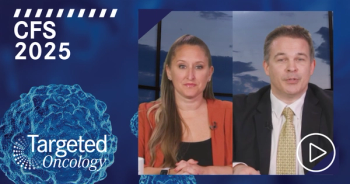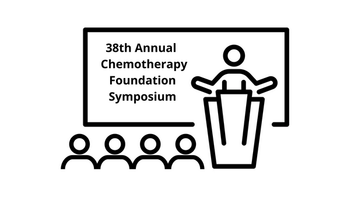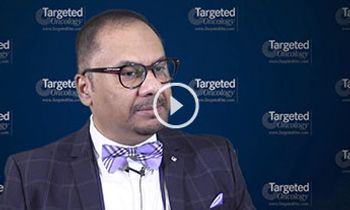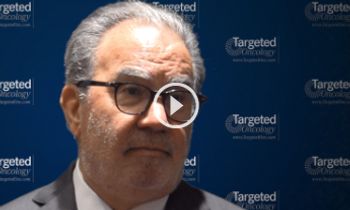
Explore the evolving role of medical oncologists in treating non–muscle invasive bladder cancer with innovative immunotherapy options and trial insights.

Your AI-Trained Oncology Knowledge Connection!


Explore the evolving role of medical oncologists in treating non–muscle invasive bladder cancer with innovative immunotherapy options and trial insights.

Small cell lung cancer treatment evolves with groundbreaking therapies, improving survival rates and offering new hope for patients in 2024 and beyond.

Research highlights promising advancements in renal cell carcinoma treatments, focusing on HIF-2α inhibitors and combination therapies for improved patient outcomes.

At the 43rd Annual CFS meeting, John Allan, MD, highlighted ongoing efforts to advance the treatment paradigm for chronic lymphocytic leukemia.

Join the 43rd Annual Chemotherapy Foundation Symposium in New York City for cutting-edge cancer care education and networking opportunities.


Nicole Lamanna, MD, discussed some of the ongoing clinical trials evaluating new therapies for patients with chronic lymphocytic leukemia.

At the 42nd Annual Chemotherapy Foundation Symposium, Erin Mulvey, MD, discussed the significant progress being made in the treatment of relapsed or refractory follicular lymphoma.

Over the years, cancer treatments that have improved patients outcomes have come out of clinical trial research. These studies have greatly contributed to the decline in cancer mortality in the United States since 1975, as well as the global cancer burden and mortality rate. During a presentation for the 38th Annual Chemotherapy Foundation Symposium (CFS), Clifford A. Hudis, MD, explained the need for monetary investment in research initiatives.

Ketan K. Badani, MD, discusses whether cytoreductive nephrectomies are efficacious when combined with immunotherapeutic agents in patients with renal cell carcinoma.

Ursula Matulonis, MD, took stock of the role for immunotherapy agents in the treatment landscape for ovarian, recurrent/advanced endometrial, and recurrent/advanced cervical cancers.

During a virtual presentation for the 38th Annual Chemotherapy Foundation Symposium, Janice M. Mehnert, MD explained the science behind selecting the optimal adjuvant therapy for patients with BRAF-mutant melanoma. The options Mehnert weighed were immunotherapy and BRAF-targeted therapy.

In the treatment landscape of metastatic castration resistant prostate cancer, the introduction of PARP inhibitors as a therapeutic option has led to progress, explained Maha Hussain, MD, in a presentation during the 38th Annual Chemotherapy Foundation Symposium.

Marc J. Braunstein, MD, PhD, discusses chimeric antigen receptor T-cell therapies, Bruton’s kinase inhibitors, and brentuximab vedotin that were highlighted at the 2020 Chemotherapy Foundation Symposium.

While the treatment landscape for chronic lymphocytic leukemia has expanded with an explosion of new therapeutic options, physicians are plagued with questions about sequencing therapies for those who progress following therapy in the first-line setting, and little data exists to guide optimal therapy selection, according to Anthony Mato, MD.

A general framework can be utilized to guide treatment decision in patients with follicular lymphoma, according to John P. Leonard, MD. During a presentation for the 38th Annual Chemotherapy Foundation Symposium, Leonard also explained that bulk of disease, comorbidities, and toxicity, among others are all factors that impact treatment decisions.

Outcomes for patients with myelodysplastic syndrome range from a median of 5.3 years in the lower-risk population to 8.4 months among patient with very high-risk disease. These outcomes are changing as novel therapies for the lower-risk population enter the treatment landscape.

Wasif M. Saif, MD, discusses available novel therapies for hepatocelluclar carcinoma.

Immunotherapy combination regimens have revolutionized the first-line treatment paradigm for patients with clear cell renal cell carcinoma, explained Robert J. Motzer, MD, at the <em>37th Annual</em> CFS.

PARP inhibitors are increasingly relevant for frontline maintenance indications and potentially in combination with chemotherapy for treatment-naïve ovarian cancer, including for those with <em>BRCA</em>-wildtype disease, Leslie M. Randall, MD, said to the audience at the <em>37th Annual</em> CFS.

Immunotherapies and targeted therapies have greatly impacted the treatment of advanced melanoma and are beginning to make their way into earlier settings, with FDA approvals for adjuvant therapies and studies ongoing in the neoadjuvant space, according to a presentation by Jeffrey S. Weber, MD, PhD, at the <em>37th Annual</em> CFS.

A. Oliver Sartor, MD, discusses a discrepancy found between conventional imaging and PSMA PET/CT scanning for prostate cancer.

There are at least two dozen different B-cell maturation antigen-directed therapies being explored in clinical trials, Sham Mailankody, MBBS, told attendees at the 37 Annual CFS. Mailankody, an assistant attending physician at Memorial Sloan Kettering Cancer Center in New York, New York, highlighted the most promising anti-BCMA agents across several modalities, including CAR T-cell therapy, bispecific antibodies, and antibody-drug conjugates.

Deciding between a watch-and-wait approach and systemic therapy in patients with newly diagnosed follicular lymphoma should be carefully assessed based on specific disease characteristics, with follow-up tailored toward patients’ risk of relapse, according to John P. Leonard, MD.

A number of promising biologic therapies are beginning to transform the treatment of adult patients with acute lymphoblastic leukemia, with the greatest potential seen with blinatumomab and inotuzumab ozogamicin in combination with chemotherapy, according to a presentation by Hagop M. Kantarjian, MD, at the 37th Annual CFS.<br />

D. Ross Camidge, MD, PhD, director of thoracic oncology, University of Colorado, discusses mechanisms of resistance to TKIs in oncogene-driven non–small cell lung cancer.

There has been a rapid expansion to the treatment landscape for adjuvant melanoma and there is no head-to-head comparative data for the challenge of selecting between immunotherapy and targeted therapy. When selecting a type of therapy, communicating relative merits and risks of both options to patients is necessary in making a shared decision, said Hussein Tawbi, MD, PhD.

According to Anna C. Pavlick, BSM, MS, DO, MBA, the treatment landscape for cutaneous squamous cell carcinoma has changed dramatically in September 2018. During her session at the <em>36th Annual</em> CFS<sup>®</sup>, she said this is due to PD-1 inhibitor cemiplimab, the first agent approved specifically for advanced CSCC.

Personalized immunotherapy regimens for patients with cancer is a long-term goal of the immuno-oncology field, yet progress toward this goal necessitates the discovery of an effective biomarker for guiding treatment decision making, according to Jason Luke, MD.

Robert A. Figlin, MD, director, Division of Hematology/Oncology, professor of biomedical sciences and medicine, Cedars-Sinai Medical Center, discusses the potential for immunotherapy/TKI combinations in the treatment of advanced renal cell carcinoma.